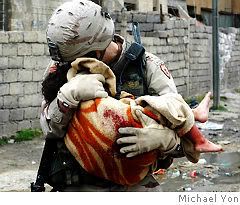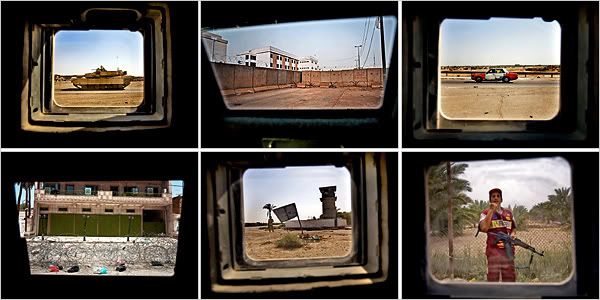Iraq: Being Intellectual Vs. Being There
 Can intellectual firepower and studied perspective lead us to the right course in the War on Terror, or is gritty truth and a boots-on-the-ground understanding what will give us the best chance?
Can intellectual firepower and studied perspective lead us to the right course in the War on Terror, or is gritty truth and a boots-on-the-ground understanding what will give us the best chance?Real Clear Politics lets us ponder this today by putting the two perspectives side-by-side. Logging in with the intellectual perspective is political science prof and Canadian liberal parliamentarian Michael Ingatieff, writing in today's NYT Magazine. Giving the grounded boots viewpoint is Michael Yon, writing in today's NY Daily News.
Ingatieff has been to Iraq, supported the removal of Saddam because of his passion for the Kurdish people, but doesn't get three words into his essay without using the word "catastrophe." He avoids blaming the catastrophe on most of the usual Lefty targets -- lust for oil, power cabals -- but settles on a diminished Bush: Not the village idiot, but lacking the introspection necessary for true leadership.
The sense of reality that might have saved him from catastrophe would have taken the form of some warning bell sounding inside, alerting him that he did not know what he was doing. But then, it is doubtful that warning bells had ever sounded in him before. He had led a charmed life, and in charmed lives warning bells do not sound.Ingatieff criticizes political leaders who make judgments based on emotions, but here he's fallen into the trap of emotionally clinging to the dim-witted Bush canard that is so pivotal to the Lib belief system.
If Ingatieff had a sense of reality regarding Bush, he might have avoided this error, realizing that being the son of a powerful man can be a bell-ringer, as can overcoming addiction, having businesses fail and being investigated. If Ingatieff thinks only the "uncharmed," presumably working class stiffs and college poli-sci professors, have the antennae to sense trouble, he's sorely mistaken.
Bush epitomizes much of what Ingatieff admires in politicians -- particularly a willingness to be unpopular in order to pursue a greater good -- but his essay fails because it falls into the Left's mistake of focusing on Bush instead of focusing on the war. Bush will come and go, but the war will be with us until radical Islam surrenders or conquers us.
Like all who want out of Iraq, Ingatieff seems to think diplomacy will be the answer, and that jihadists can be made to put down their C4:
Fixed principle matters. There are some goods that cannot be traded, some lines that cannot be crossed, some people who must never be betrayed. But fixed ideas of a dogmatic kind are usually the enemy of good judgment. It is an obstacle to clear thinking to believe that America’s foreign policy serves God’s plan to expand human freedom. Ideological thinking of this sort bends what Kant called “the crooked timber of humanity” to fit an abstract illusion. Politicians with good judgment bend the policy to fit the human timber. Not all good things, after all, can be had together, whether in life or in politics.His "politicians with good judgment" would dance with evil because they don't think America should stand for, and certainly not fight for, the freedom of others. There is no realization that if we don't fight for the freedom of Iraqis over there, like we fought, ostensibly, for the freedom of Europeans over there in WWII, then the battle will come closer and closer to the homeland.
He can support this kind of thinking because he sees the war as a matter of good and bad compromises, not a battle between good and evil:
Knowing the difference between a good and a bad compromise is more important in politics than holding onto pure principle at any price. A good compromise restores the peace and enables both parties to go about their business with some element of their vital interest satisfied. A bad one surrenders the public interest to compulsion or force.But who are the "both parties" we're talking about here? It's not the Republicans and the Democrats, or even the West and the Muslims. It's the forces of freedom and the forces of jihad. What compromise is there to make? The jihadists will not compromise, although they may affect compromises to advance their position in the global war.
In short, for all his intellectual firepower, Ingatieff fails to recognize the battle. He focuses on the politics and the leader, not the nature of jihad and the nature of American Democracy, and thus he fails.
Yon, on the other hand, is not given to over-intellectualizing; over-observing is his bent. Few others are so compelled to observe first hand the front lines of the war on terror that they would place themselves in harm's way to see it for themselves. (It's interesting that the Ingatieff piece was illustrated by this collage by Benjamin Lowry ...
 ... which was taken through the window of an armored vehicle, while Yon's photos, like the lead one on this post, are taken from an "over-observing" point of view, usually the same view the soldiers he's with have when they're fighting skirmishes or patrolling neighborhoods.)
... which was taken through the window of an armored vehicle, while Yon's photos, like the lead one on this post, are taken from an "over-observing" point of view, usually the same view the soldiers he's with have when they're fighting skirmishes or patrolling neighborhoods.)Yon knows the stakes:
Amid all this talk of timetables for the War in Iraq, blurred as they are by a strange lemming-like compulsion to declare the "surge" strategy a failure almost before it actually began, one deadline looms larger with each passing day: It's time for a reckoning with the truth.And to him, the truth is clear:
When it comes to Iraq, being there matters because of the massive disconnect between what most Americans think they know about Iraq, and what is actually going on there.
The current controversy about the extent to which Al Qaeda is a threat to peace in Iraq is a case in point. Questions about which group calling itself an offshoot of Al Qaeda is really an offshoot of Al Qaeda is a distraction masquerading as a debate.
Al Qaeda is in Iraq, intentionally inflaming sectarian hostilities, deliberately pushing for full scale civil war. They do this by launching attacks against Shia, Sunni, Kurds and coalition forces. To ensure the attacks provoke counterattacks, they make them particularly gruesome.
Yon sees big changes in Iraq: Enemies who are now allies, in Iraqi army of growing capability, and an American general, Patreus, who "may well prove to be to counterinsurgency warfare what Patton was to tank battles with Rommel, or what Churchill was to the Nazis."
Seeing all this, Yon is hedging his bets until Patreus' report in September, because he doesn't buy into this, the biggest mistake in Ingatieff's analysis:
One thing is clear: The costs of staying will be borne by Americans, while the cost of leaving will be mostly borne by Iraqis.
At this point in time, the position isn't far off, but what politician, what political science professor, ever achieved greatness by looking at so short a term?
Yon knows, from having the stink of al Qaeda's brutality burn his nostrils, what will come next: first bloodshed in Iraq, but then, flushed with victory and still committed to spreading Islam by the sword, bloodshed everywhere.
Labels: Bush, Leftism, War in Iraq, War on Terror




<< Home